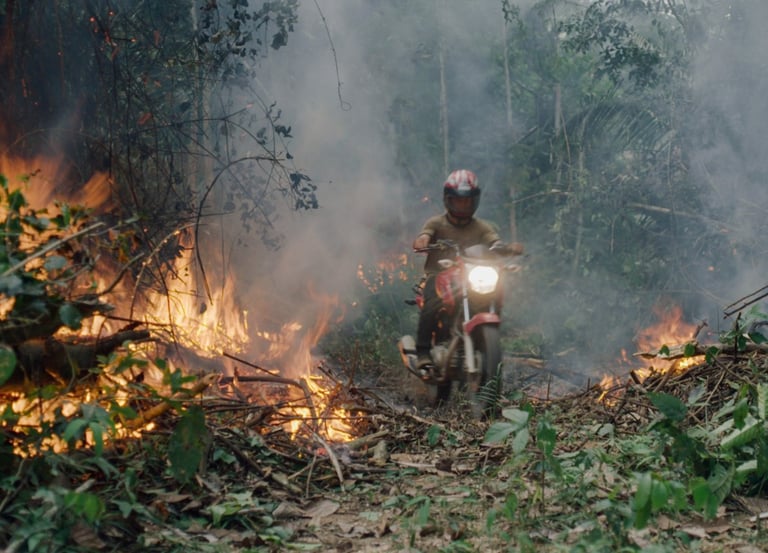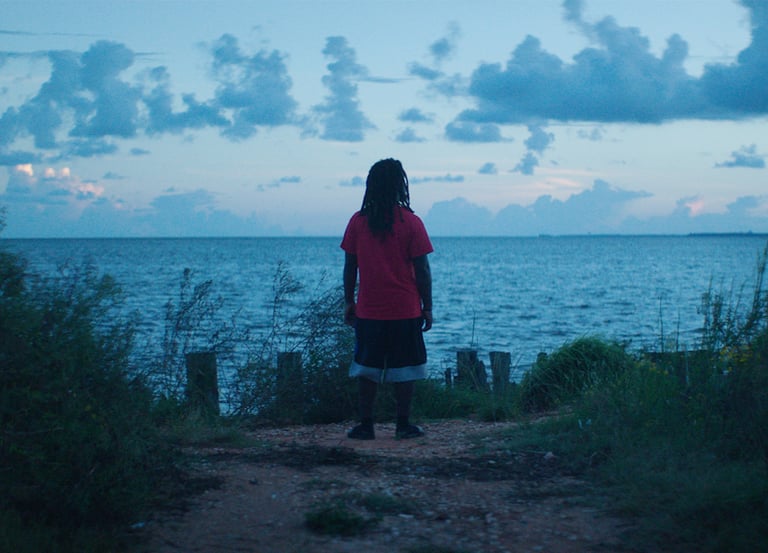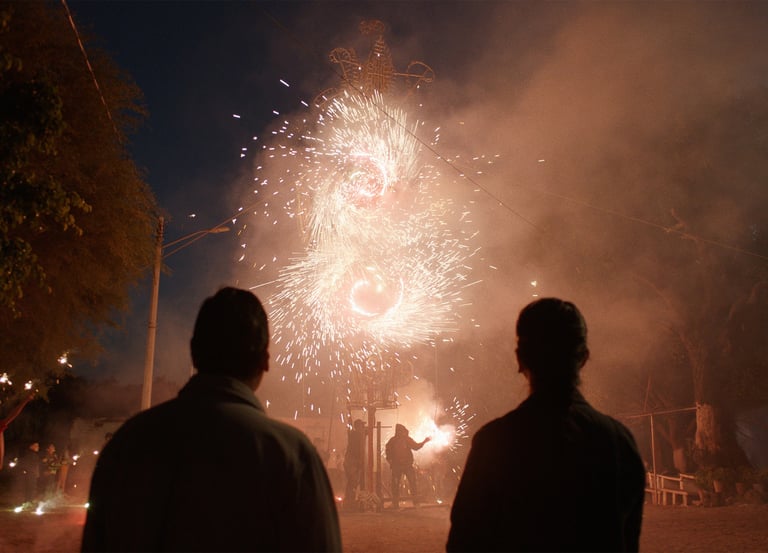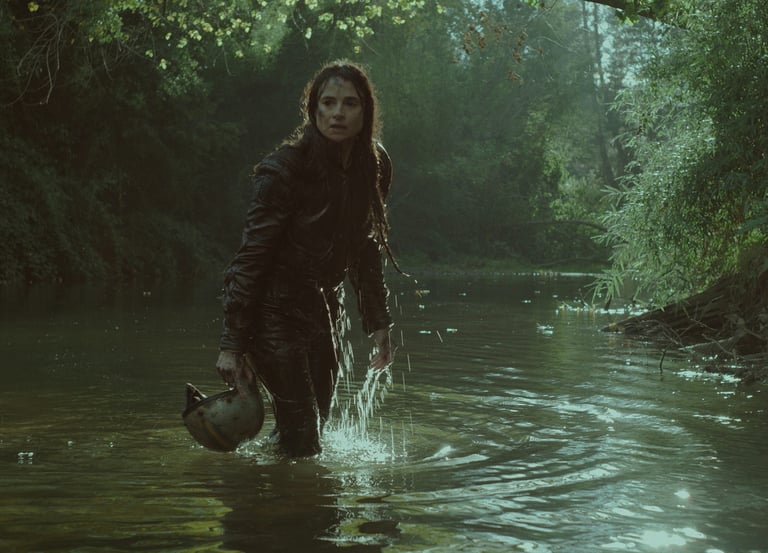Sundance 2022 - Deep Vibes
MINI REVIEW 3 /// Category 3: intense, heavy feelings
SUNDANCEELLA THOMPSON
The Territory (dir. Alex Pritz, Brazil/Denmark/United States)
Exceptional. A first of its kind, this was co-produced by the Indigenous Uru-eu-wau-wau people and follows their ongoing and very present struggle against the illegal deforestation and encroachment into the Amazon and Indigenous culture. It also features Brazilian environmentalist Neidinha, who is particularly close with Uru-eu-wau-wau residents Bitate and Ari, while she does everything she can to support the Uru-eu-wau-wau people and advocate for them. Politicians have made settlers like the ones featured in this documentary feel like they have a right to invade the rainforest; however, these Indigenous people are not just fighting to save their tribe against this invasion, but they are also acting as the last stand against the ultimate destruction of the Amazon. The Amazon is often mentioned for providing a lot of oxygen to the atmosphere, but what’s more alarming is how it plays a hand in reducing CO2 build up in the atmosphere - reducing global warming. Tropical forests are carbon sinks and the reduction of those will further devastate our atmosphere. It’s happening quickly.
I won’t say who because I think it’s important to see it unfold in the documentary, but there’s a shocking event about halfway through where one of the leading voices of the Indigenous people is killed by these settlers. A very disturbing development - not only do these settlers intend to kill them, but COVID-19 becomes a factor that takes out a good 10% of who is left in their population. When COVID hit the Uru-eu-wau-wau, they were sent the equipment to continue the filming on their own. They currently actively go and find settler camps and burn them, but settlers are trying to settle around their territory to cut them off. This film left me with an urgent feeling, a necessary consciousness.


Descendant (dir. Margaret Brown, United States)
A favorite from this year’s festival - it feels close to home. This is a must see documentary for Americans in our lacking education system. I had heard of this situation, but this is so much more than just the finding of a lost slave ship. This is the story of the people of Africatown in Mobile, Alabama, the descendants of the last slave ship, Clotilda, that was illegally sailed to Mobile in 1860. It is the most intact sunken slave ship ever found despite its owners atttempt to destroy it and the misdirects to keep people from locating it for years. My favorite aspect of this film is that it’s not truly about the finding of Clotilda (which appeared to have been tampered with at some point long after its sinking), but about the Africatown people who’ve maintained their community and history after all this time. It feels like we’re really getting to hear from them rather than about them.
The fact that they can see and know exactly where their ancestors came from and landed is both powerful and harrowing - it’s important that they can confirm the history they’ve always believed, but it’s definitely heavy knowledge. The Africatown region has a high rate of cancer and illness due to the factory developments around them - land being sold by the old white Meaher family, the same family that ordered Clotilda. The continuing pattern of the same old, white, powerful families in the South running the same regions for over 100 years…what has changed and what has remained the same since 1860?
A lot of things I haven’t mentioned feature in this documentary: Cudjoe Lewis, founder of Africatown; groundbreaking filmmaker Zora Neale Hurston; historical gravesites; shipwreck divers; leadership and gathering; the Meaher family declining comment. The residents are in contact with the National Museum of African American History and Culture in D.C., excited to conserve and bring attention. However, one Africatown resident is a real estate agent and she’s concerned that the attention to the area might lead to further invasion into their community. There are positives and negatives to this complex situation, and time will tell if these new historical protections give the Africatown residents any more power against industrial invasion and the Meahers - but what an achievement to unearth this self-legitimizing piece of history.




Dos Estaciones (dir. Juan Pablo González, Mexico)
This was very patiently created. Oftentimes utilizing great amounts of space and allowing things to move as slowly as they may within them, González skillfully captured desolation, isolation, and what it’s like to breathe in the highlands of Jalisco. You could feel the weight or responsibility for lead Maria Garcia (played by the stunning Teresa Sánchez), whose inherited tequila business is being outgunned by American companies settling nearby. A lot of scenes in this film feature the camera far away and completely still for long periods of time, making the people inside the frame look very small and allowing any motion to naturally continue without any camera movement intervention. Slow and (un)steady.
There’s some interesting inclusions next to just Maria’s story that give us more insight into the people of this town and Maria, such as a beautician that Maria often sponsors in her endeavors despite having little money to spare. Maria is a very prideful, stoic person with an incredible game face. She keeps losing business and employees to these new American companies in a sad pattern but does take on a new “protégée” of sorts who becomes her daughter figure, featuring a cathartic dance scene between the two. The only time you see Maria smiling other than that moment is when she’s flooring a truck around a dirt road, doing donuts. Seeing this heavy dichotomy of emotion made it easy to feel the weight of the world on Maria’s shoulders - and I enjoyed getting to know the town and the people on its own. It’s a very community driven film with a unique pace and style.
The most striking sequence comes after a storm floods her business and makes it inoperable while the new companies down the road can continue business - it’s her silent breaking point. Not one to take things lying down, Maria makes her way over to the American fields at night and sets it on fire in a slow process while we watch her stand in the flames. The next day, we follow a slow one shot of the beautician making her usual errands-run through the town, with the backdrop audio of radio reports about the field burning. Life goes on. We don’t know what happens to Maria next other than her being pleased with herself - she might not be able to compete with these companies, but she’ll definitely take her revenge. Stylistically brilliant.
Nanny (dir. Nikyatu Jusu, United States)
I went into this blind, impulsively buying a ticket after seeing Jusu’s reaction to winning the Grand Jury Prize (I wasn’t disappointed). My mouth dropped open so many times while watching this film, particularly in its perfectly balanced third act. The basics of this story is that Aisha (Anna Diop) is an immigrant nanny in NYC caring for a wealthy family’s child while trying to earn enough to bring her young son over from Senegal in time for his birthday. I really don’t want to spoil much from this - it’s a frightening immigrant experience that’s at its best when you let it wash over you. Her experience as a nanny is difficult, frustrating, and scary to watch. There were portions of the first and second act that dragged for me, but once we got into the thick of the action I was completely captivated and shocked.
Aisha begins to have visions and nightmares of spiders crawling all over her and inside her; there’s even portions where she attacks with a knife and almost kills the kid she’s caring for as she can’t tell her haunted hallucinations from reality (or why they’re happening). She’s also able to form a happy relationship with a man, the descendant of an elderly psychic woman who tries to help her sort out her visions. I don’t know much about Senegalese folklore, but I don’t think it’s a requirement to be taken by this film - on concept and third act alone it deserved this award - and the ending left me reeling.




The Cow Who Sang A Song Into The Future /// La Vaca Que Canto Una Cancion Sobre El Futuro (dir. Francisca Alegria, Chile)
Very metaphorical, very magical - I was left understanding and questioning. Combining magical realism and environmentalism, this story observes a family becoming more and more distant from one another. It stars Mía Maestro as Magdalena, the mother who killed herself by riding her motorbike into a river years and years ago, who has suddenly resurfaced from the polluted waterway in the present and begins to silently wander home - spotted by her now elderly husband. Magdalena’s daughter, Cecilia (Leonor Varela), thinks that her dad has lost it and is seeing things, so she takes her two children to the family farm to keep an eye on him. Simultaneously, Cecilia’s tense relationship with her oldest child Tomas is impacting Tomas’ mental health (played by Enzo Ferrada who is nonbinary) as Cecilia is incredibly unaccepting of them.
Magdalena seems to be a representative: she frees the abused cows on the farm, who end up drinking polluted water and dying - a very graphic-feeling scene where the horrible father has to grapple with the loss of what he’s built, which is an abusive farm his wife was entirely against; she is the only adult figure who accepts Tomas, who is in the same dark place that Magdalena was once in; she reveals the true dark nature of her husband to her children. She never speaks, but her powerful performance doesn’t require it and neither does an allegorical script where you’re often purposefully left in mystery. Why has Magdalena come back for this brief time - why now? For who?
Death is how Magdalena escaped her situation, regardless of how it impacted her children, and her return launches a rebirth of the family and the farm. She handles her unfinished business. All the cows die except for the babies, who assuredly will be having a less troubled life than their parents; Cecilia comes off her high horse and makes things work with Tomas, likely saving their life. The cows can only die to find peace, but Tomas needs to live. Not only does this deal with themes of environmental abuse and animal abuse, but also with familial abuse. Sometimes Magdalena appears as other people, sometimes it’s unclear why she’s doing what she’s doing; she’s already dead. It doesn’t matter that I wasn’t always able to keep track of what everything might mean because this film is most powerful when it makes you analyze. Overall, this was a very ambitious concept that follows a narrative of its own tune. I’d love to see it again.
"The Territory" (acquired by National Geographic)
"Descendant" (soon Netflix)
Teresa Sánchez in "Dos Estaciones" (TBD)
Anna Diop in "Nanny" (TBD)
Mía Maestro in "The Cow Who Sang A Song Into The Future" (soon Apple TV+)
